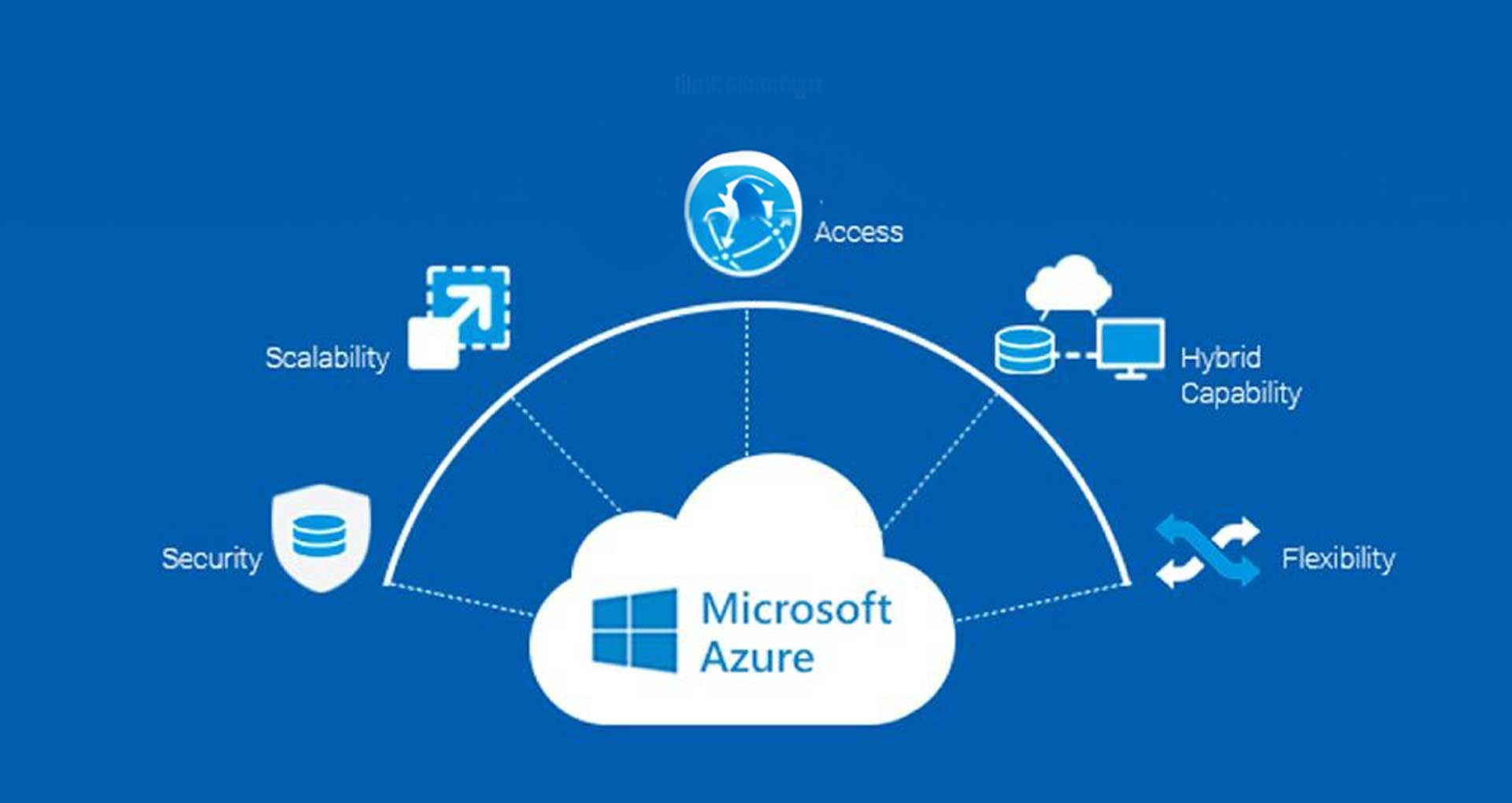Data-driven and automation solutions provide modern businesses with a way to sustain long-term success in the ever-evolving market and customer demands. In the booming era of AI, Microsoft’s launch of the Azure AI platform offers an opportunity to integrate AI/ML capabilities into business applications and processes without the demand for a high level of expertise. Azure AI services provide a powerful combination of the latest AI models and cutting-edge tools to streamline operations and accelerate digital transformation.
With the growing adoption of Azure AI services, it’s crucial for developers and businesses to understand how to leverage these tools effectively for maximum impact. Read our insightful blog post, where we have covered crucial aspects of Azure AI development, its benefits, different types of Azure services, best practices for implementation, and much more. Let’s dive in!
Benefits of Azure AI Services
Microsoft Azure AI is designed to democratize the AI development process for developers, bringing together the models, tools, services, and API integrations to solve business needs faster.
Benefits of Azure AI Services for Machine Learning & AI Development

- Pre-Built Customizable AI Models: Azure AI offers a wide range of ready-to-use and customizable AI models from Meta, Mistral, Hugging Face, OpenAI, Cohere, Nixtla, G42 Jais, and many more that can be easily integrated into business applications and services. These allow developers to focus on building applications and reduce development time.
- Advanced Hardware Acceleration: Azure AI Studio, which serves as an IDE for developing and deploying generative AI applications, enables access to NVIDIA GPUs and FPGAs, which help developers run complex AI models and handle intensive AI workloads.
- Support for MLOps to Streamline Development: The cloud-based platform offers comprehensive support for Machine Learning Operations for collaboration and automation in development across the entire ML lifecycle. It helps developers to create, manage, and govern machine learning models and data pipelines.
- Seamless Integration Capabilities: Azure AI integrates seamlessly with other Azure services, creating a unified platform for AI development. It enables developers to build scalable and secure AI applications by leveraging existing Azure infrastructure.
- Boosts Developer Productivity with Copilot Experiences: Copilot experiences powered by Azure AI Services increase developer productivity by providing them with intelligent code suggestions, automating code writing for repetitive tasks, and helping in the onboarding of junior developers across a seamless development environment. Copilot helps boost efficiency and satisfaction by cutting down on distractions from context-switching as it promotes deep work. Azure provides scalable infrastructure, customizable AI models, and integrated MLOps with the aim of driving innovation coupled with simplified collaboration and reduced development complexity and cost. Developers can quickly build and deploy powerful ML solutions, generate code, manage resources, and fine-tune models using simple language prompts. Such a workflow ensures faster efficiency and compliance with the best working practices and regulatory issues.
Business Benefits of Azure AI Services

- Data-driven Decision Making: Azure AI services enable businesses to better utilize advanced machine learning models, data analytics, and AI tools for better data gathering and manipulation, making it actionable. Data-driven insight allows businesses to unfold patterns and trends for predictive analytics, efficiently manage risk, and ensure business growth with appropriate data-based decision-making.
- Enhances Customer Engagement: Satisfying customers and clients is the core factor of surviving in the market. Thus, you, as a business, can utilize Azure artificial intelligence services to explore the ability to create an AI-powered chatbot for serving customers with extended support, a recommendation engine, and sentiment analysis to ensure personalized marketing throughout.
- Optimizes Business Operations: Diverse industries with a wide array of operations and workflows are increasingly dependent on the latest technologies like AI, giving businesses an opportunity to optimize processes. Azure AI’s comprehensive tools and services can be integrated into a wide range of solutions. These include IoT predictive maintenance, supply chain software solutions, process automation, quality control solutions, fraud detection, and more.
- Scalable and Flexible: Azure AI services cloud infrastructure, which includes hybrid and multi-cloud approaches, enables dynamic resource allocation. As a result, applications can be scaled and integrated across Microsoft products based on workloads. It also offers you the flexibility to choose from a range of AI technologies to enable customization, which enables businesses to better utilize machine learning advanced models, data analytics, and AI tools.
Different Azure AI Services to Build AI Applications
The following Azure AI services help build more secure, intelligent, cutting-edge, and market-ready generative AI applications.
1. Azure Machine Learning
- Purpose: ML model training and development
- Features: Drag-and-drop interface, automated machine learning (AutoML), and integration with popular frameworks like TensorFlow and PyTorch. It also supports MLOps for managing the lifecycle of machine learning models.
- Use Cases: Predictive Maintenance, Customer Churn Prediction, Fraud Detection, Demand Forecasting
2. Azure Cognitive Services
- Purpose: To add pre-built AI capabilities to applications.
- Categories:
- Vision: Computer Vision, Face API, and Custom Vision for image and video analysis.
- Speech: Services for speech-to-text, text-to-speech, and real-time translation.
- Language: Tools like Text Analytics, Language Understanding (LUIS), and Translator to analyze and interpret natural language.
- Decision: Services like Personalizer and Content Moderator to make informed decisions based on data.
- Search: Azure Cognitive Search for adding sophisticated search capabilities to applications.
- Use Cases: Monitoring & quality control, Voice Assistance, Sentiment Analysis, Personalized Recommendation.
3. Azure Bot Service
- Purpose: To build and deploy intelligent bots.
- Features: Integrates with the Bot Framework and offers tools to create, test, and publish bots on various platforms like websites, Microsoft Teams, and other messaging apps. It can be further enhanced with Azure Cognitive Services for advanced capabilities.
- Use Cases: Customer support bot, Appointment scheduling, employee onboarding.
4. Azure Cognitive Search
- Purpose: To integrate powerful search capabilities into applications.
- Features: Offers full-text search, AI-powered search capabilities, and integrates with Cognitive Services for advanced data analysis.
- Use Cases: eCommerce search, Document management, customer self-service.
5. Azure Document Intelligence
- Purpose: To extract information from documents and forms.
- Features: Automatically extracts text, key-value pairs, and tables from documents, enabling automated data processing and entry.
- Use Cases: Invoice processing, document automation, expense management.
6. Azure Video Indexer
- Purpose: To analyze video content.
- Features: Provides AI-driven insights like object detection, speech transcription, sentiment analysis, and face recognition from video files.
- Use Cases: Content tagging, compliance monitoring, video content analysis.
7. Azure OpenAI Service
- Purpose: To integrate advanced (LLMs) large language models into applications.
- Features: Access to GPT models for generating text, summarizing content, answering questions, and more. The Phi-3.5-Mini-Instruct model enables organizations to develop smaller, more efficient AI models that outperform larger models in scenarios like deployment in edge computing scenarios where resources are limited.
- Use Cases: Content generation, customer interaction, summarization.
8. Azure Cognitive Services Containers
- Purpose: To deploy Cognitive Services on-premises or on the edge.
- Features: Allows businesses to run AI models locally for scenarios where data security and compliance require it.
- Use Cases: On-premises AI, Edge AI, Custom compliance.
9. Azure Translator
- Purpose: To provide real-time text translation across multiple languages.
- Features: Supports over 70 languages, offering customizable translation models and integration with other Azure services. It also includes a custom translator for domain-specific translation.
- Use Cases: Multilingual solution (website, app), Cross broader communication.
10. Azure Custom Vision
- Purpose: To create custom image classification and object detection models.
- Features: Provides a user-friendly interface to train models with your images, offering precise image recognition capabilities.
- Use Cases: Product recognition, Healthcare Diagnostics, Wildlife Monitoring.
11. Azure Speech Service
- Purpose: To enable speech recognition, synthesis, and translation.
- Features: Supports various languages and accents. Enables customizable speech models for industry-specific terminology.
- Use Cases: Voice-Activated Assistants, Transcription and Captioning, Interactive Voice Response (IVR)
12. Azure AI Face Service
- Purpose: To detect and analyze faces in images.
- Features: Leverage AI algorithms for facial analysis capabilities for face detection, face verification, and person identification.
- Use Cases: Application in security, attendance tracking, and personalized user experience in smart devices.
13. Azure AI Studio
- Purpose: To build, test and deploy GenAI apps and custom copilots on one unified platform.
- Features: Offers drag-and-drop tools and coding options, access to over 1,600 models along with prompt building and testing tools.
- Use Cases: Custom copilots, intelligent apps, document summaries, personalized recommendations, business process automation, and scalable deployment.
14. Prompt Flow
- Purpose: To simplify the process of designing, testing, and managing prompt-based AI workflows.
- Features: Create and test prompt flows with models, data, automation, and built-in debugging and monitoring.
- Use Cases: Prompt engineering, RAG, A/B Testing, QC, and production readiness for AI applications.
The following Azure AI Services have been retired but are still available for existing applications:
- Anomaly Detector
- Content Moderator
- Language Understanding
- Metrics Advisor
- Personalizer
- Q n A Maker
ML and AI Solutions That Can Be Developed Using Azure AI
Let’s explore some AI-powered applications and solutions we can develop using Azure AI services.

Chatbot and Virtual Assistants Development
Intelligent chatbot solutions deliver personalized services, provide human-like responses, and solve customer queries and FAQs. These are built with the capabilities of machine learning models and natural language processing. The comprehensive Azure AI software development toolset provides end-to-end support for developing and deploying chatbots.
Key Azure AI services leveraged include:
- Azure Bot, which offers features like natural language understanding, dialog management, and integration
- Azure Cognitive Services, which enables speech recognition, text-to-speech, and language understanding
- Azure Computer Vision through AI-designed pre-trained modules.
- Azure App Service that hosts chatbots or virtual assistants.
Speech and Language Application Development
Azure AI services enable businesses to choose and develop various forms of speech and language applications such as speech recognition, text-to-speech or speech-to-text solutions, and more. This application can be used in multiple domains, including education, healthcare, and entertainment. Azure AI services like Azure Speech, Azure Function, and Azure Cognitive are playing a crucial role in developing more intuitive and accessible applications. This voice-driven application can cater to diverse users with overall responsiveness and effectiveness.
Image and Video Analysis Solution
Leveraging Azure AI application development, businesses can build image and video analysis solutions that can help detect and categorize patterns and objects and monitor activities. It gives a path to improved efficiency, productivity, and accuracy in the work process. For instance:
- Retail and manufacturing businesses can effectively manage their inventory, track stock levels, and help diagnose medical conditions through remote monitoring.
- Azure AI services can help build scalable and customized AI models with video and image capabilities to reduce manual workloads, foster instant decision-making, and focus on top-quality services.
Anomaly and Fraud Detection Application
Safeguarding operations and processes has become a top priority for many businesses, including those in financial services, banking, healthcare, and manufacturing. By developing advanced anomaly and fraud detection applications, businesses can identify unusual activities by analyzing patterns in real time. Azure AI application development streamlines this process, making it quicker and more efficient for industries such as manufacturing, supply chain, and logistics to build anomaly detection solutions. These solutions can detect irregularities in equipment performance or processes, enabling proactive maintenance and reducing the risk of significant losses.
Multimodal Generative AI Solutions
AI now works with text, images, audio, and video. This lets you build smarter apps that can analyze, create, and interact across more types of content. Teams use these models to power everything from virtual assistants to creative tools. Azure AI Studio helps you build and deploy them quickly, using either prebuilt models or your own.
Autonomous AI Agents
You can now build AI agents that complete tasks without human help. They use real-time data, connect with your systems, and keep work moving. Azure AI Agent Service supports these agents so they can handle everything from monitoring to decision-making. Discover how Azure AI agents can transform your business through automation.
Computer Vision Applications for Industrial and Retail Use Cases
Computer vision is helping businesses run more efficiently. It checks product quality, tracks inventory, monitors safety, and understands customer behavior. Teams can use Azure tools to build such smart systems for factories, warehouses, and stores and make thier everyday tasks faster and more accurate.
AI-Powered Document Processing
Manual data entry slows things down. Azure AI Document Intelligence reads and organizes information from forms, tables, and handwritten notes. It handles large volumes quickly and accurately, whether you run it on the cloud or at the edge.
Responsible AI and Ethical AI Governance
Azure includes tools that track model behavior, protect data, and follow legal standards. These tools help your team stay in control and build systems that people can trust because using AI responsibly matters.
Best Practices for Azure AI/ML Development
Azure AI is reshaping the industry landscape by delivering data-driven insights, advanced machine learning algorithms, and comprehensive data analytics. Here is a list of best practices for building secure, ethical, and efficient AI solutions:
- Data Management: Effective data gathering, storage, processing, and activation are crucial for successful Azure AI services. Ensuring that data is accurate, easily accessible, and secure is key to building reliable AI models and applications.
- Selection of Appropriate Model: Choosing the right model architecture based on your defined use cases leads to a simpler, more effective solution. Utilize Azure Machine Learning’s model selection capabilities to compare different models.
- Documentation for Each Step: Creating comprehensive documentation, especially for AI/ML projects, acts as a backbone and facilitates knowledge transfer. Record each phase and process involved in project development, including data gathering, management, and processing.
- Ensure Data Privacy and Security: Implement robust access controls and authentication mechanisms to protect sensitive and critical data. Leverage Azure’s encryption features, both at rest and in transit, to enhance data security.
- Leverage Azure AI Community and Resources: Refer to Azure AI documentation, samples, and tutorials to accelerate your data management efforts and stay informed about best practices and updates.
- Prompt Engineering for Generative AI: Well-structured prompts can significantly improve the accuracy of GenAI models and generate more relevant content. You can constantly refine and evaluate your prompt using services like Prompt Flow to ensure its alignment with the objectives of the enterprise.
- Integrate Vector Databases for Semantic Search: Using Azure-supported vector databases can power semantic search within AI apps. Such methodologies allow for similarity-based retrieval of unstructured data, which consists of text and images; thereby, improving content relevance and user experience.
- Strengthen Data Governance with Microsoft Purview: Implement cataloging, classification, and lineage tracking so that secure and transparent data use is guaranteed throughout the AI lifecycle. Enforcing governance measures using Microsoft Purview maintains data quality, privacy, and compliance.
- Enable Monitoring and Observability for AI Pipelines: Set up comprehensive monitoring with Azure Machine Learning or Azure Monitor to stay on top of data drift, model performance and system health. Proactive observability helps you find anomalies and fix issues in the production environment faster.
Essential Considerations for Azure AI Development
Here are key considerations that businesses should focus on while getting started with the Azure AI development process:
- Be Specific About the Project/Application Requirement: Define a clear goal for the AI project in order to ensure alignment of business and user needs. Identify the main purpose, feature, and functionality that you can develop with Azure AI services.
- Research on Potential AI & ML Development Companies: Create a proper list of companies with factors like experience, expertise, and reviews. Also, evaluate how well they will cater to unique business requirements.
- Tools and Services: There is an array of services offered by the Azure AI application development suite. Selecting the right services & tools as per your defined AI solution makes the development path easier and enable faster time to market.
- Focus on Security & Compliance: Implement robust security measures & best practices such as encryption and identity management using Microsoft Entra ID (formerly Azure Active Directory). Additionally, prioritize threat protection by utilizing Microsoft Defender for Cloud to help meet regulatory compliance requirements such as HIPAA, GDPR, SOC 2, and PCI DSS.
- Integrate Azure AI with Microsoft Fabric for Unified Data and Analytics: Connect Azure AI to Microsoft Fabric to centralize data, analytics, and machine learning on one platform. This makes it easier to find and use reliable data, build smarter solutions faster, and roll them out without extra steps. With up-to-the-minute insights, teams can react quickly and keep everything running smoothly. Fabric also helps manage data rules, keeps track of changes, and grows with your business while making AI workflows more efficient and secure.
Why Choose Rishabh Software as Your Ideal Azure AI Development Partner?
As a recognized Microsoft Partner in the Cloud Solution Provider (CSP), we offer you expert Azure AI development services to unlock new levels of efficiency and insight for your business. As your Azure consulting partner, Rishabh Software help businesses harness the capabilities of Azure AI to boost efficiency, automate tasks, and generate practical insights. We blend time-tested technical skills with a solid understanding of real business needs backed by a proven track record of delivering practical solutions that perform in the long haul. That’s why established enterprises trust us to meet high standards, stay compliant, and deliver tangible results.
We’re proficient at integrating smart, efficient AI solutions that improve decision-making, automate tasks, and unbolt new business value. With proven expertise in Azure’s robust cloud infrastructure, Rishabh Software enables businesses to scale AI solutions efficiently to meet business needs without significant upfront investments. Through our cloud managed services, we keep your AI systems secure, optimized, and cost-effective. We also offer AI consulting services to ensure a strategic roadmap, architecture alignment, and measurable AI outcomes across your business ecosystem.
Frequently Asked Questions
Q: What is Azure AI Services?
A: Azure AI Services is a comprehensive suite of AI and machine learning tools that empower businesses to easily build, deploy, and manage AI applications under the umbrella of Microsoft’s Azure cloud platform. It includes a variety of pre-built and customizable tools, enabling businesses to seamlessly integrate AI without requiring extensive expertise. Key components include Azure Machine Learning, Cognitive Services, Azure Bot Services, Azure OpenAI, and many more.
Q: What Are Common Azure AI Industry Use Cases and Examples?
A: Here is a list of industry-specific Azure AI use cases:
- Healthcare: Improve accuracy in disease detection, create plans based on patient-specific data
- Retail: Deliver customized shopping experience, enable effective stock management
- Finance: Make it easier to identify & mitigate fraudulent activities, foster data-driven decision-making
- Manufacturing: Helps in preventing equipment failures, gives a better vision of quality control
Here is a list of real-life examples where businesses have utilized Azure AI services:
- Walmart: Walmart is applying AI on Azure to build chatbots that can guide customers and forecast demand for different commodities.
- Starbucks: One of the current ways that Starbucks is leveraging Azure AI is to create a new ordering system that is able to suggest orders to a customer based on the orders that they have made in the past.
- Netflix: One of Netflix’s current uses for Azure AI is to come up with a recommendation system that suggests to customers what movies or TV serials they should watch based on their history.
- Volkswagen: Volkswagen continues with Global translation using Azure AI, where they translate over 16000 projects daily through the help of a neural translator.
- ON: It optimizes the power grid inspecting systems by adopting AI-enabled drones over Azure to improve effectiveness and safety levels.
- Swift: In today’s world, Swift wages the battle against financial fraud with Azure Machine Learning, building advanced anomaly detection models for safe transactions.
Q: Can Azure AI Be Integrated into Existing Applications?
A: Yes, Azure AI services can be integrated into existing applications or solutions. Microsoft provides developers with various APIs and SDKs that allow them to embed AI capabilities, such as machine learning models, natural language processing, computer vision, and more, into existing systems.
Q: What’s the difference between Azure AI and Azure OpenAI?
A: Azure AI is a broad platform for many AI projects. The platform integrates pre-trained AI models from Microsoft, Meta, Cohere, etc. It also features easy-to-use tools for configuring AI assistants, automating workflows, and connecting siloed data sources. You can build complex solutions, whether through visual representation, no-code, or low-code tooling. It offers excellent governance, security, and compliance mechanisms for enterprises.
Azure OpenAI is a service under Azure AI. It provides direct access to OpenAI’s cutting-edge generative models, such as GPT-4, DALL·E, and Codex. You can integrate these capabilities into your applications with ease and equip your projects with the most advanced generative AI models from OpenAI.
Q: What can businesses build with Azure AI Studio?
A: You can use Azure AI Studio to:
- Build custom AI assistants for automating business processes and complex workflows. These smart bots and conversational tools can understand, analyze and respond to your data.
- Build apps that summarize data, classify information, generate content, or offer recommendations based on text, image, or audio input.
- Analyze documents, extract insights from unstructured data, and convert that information into actionable results.
- Combine AI models from OpenAI, Microsoft, Hugging Face, Meta, and Cohere to tackle real-world business problems.
- Speed up software development with integrations for code-assistants that can write code, migrate existing code, or generate documentation.
- Integrate vision/speech/language capabilities such as OCR, voice assistants, accessibility tools, and content moderation to enhance user experience and safety.
- Deploy AI solutions securely across cloud, edge, or Kubernetes environments with enterprise-grade monitoring, governance, and compliance.
- Visually design, manage, and deploy AI projects using intuited no-code tools.








